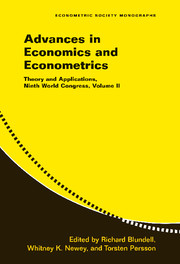Book contents
- Frontmatter
- Contents
- Contributors
- Introduction by the Editors
- Advances in Economics and Econometrics
- 1 Empirical Models of Auctions
- 2 Identification in Models of Oligopoly Entry
- 3 Empirical Models of Imperfect Competition: A Discussion
- 4 Recent Developments in the Economics of Price Discrimination
- 5 Bounded Rationality in Industrial Organization
- 6 Price Discrimination and Irrational Consumers: Discussion of Armstrong and Ellison
- 7 Behavioral Economics
- 8 Incentives and Self-Control
- 9 Discussion of “Behavioral Economics”
- 10 Dynamic Models for Policy Evaluation
- 11 Microeconometric Search-Matching Models and Matched Employer-Employee Data
- 12 Discussion of ‘Dynamic Models for Policy Evaluation’ and ‘Microeconometric Search-Matching Models and Matched Employer-Employee Data’
- 13 Field Experiments in Development Economics
- 14 Institutions and Development: A View from Below
- Index
- Titles in the series
5 - Bounded Rationality in Industrial Organization
Published online by Cambridge University Press: 05 January 2013
- Frontmatter
- Contents
- Contributors
- Introduction by the Editors
- Advances in Economics and Econometrics
- 1 Empirical Models of Auctions
- 2 Identification in Models of Oligopoly Entry
- 3 Empirical Models of Imperfect Competition: A Discussion
- 4 Recent Developments in the Economics of Price Discrimination
- 5 Bounded Rationality in Industrial Organization
- 6 Price Discrimination and Irrational Consumers: Discussion of Armstrong and Ellison
- 7 Behavioral Economics
- 8 Incentives and Self-Control
- 9 Discussion of “Behavioral Economics”
- 10 Dynamic Models for Policy Evaluation
- 11 Microeconometric Search-Matching Models and Matched Employer-Employee Data
- 12 Discussion of ‘Dynamic Models for Policy Evaluation’ and ‘Microeconometric Search-Matching Models and Matched Employer-Employee Data’
- 13 Field Experiments in Development Economics
- 14 Institutions and Development: A View from Below
- Index
- Titles in the series
Summary
Abstract
This paper discusses the use of bounded rationality in industrial organization. There is a long tradition of such work: Literatures from various decades have discussed irrationalities by firms and consumers. Three main approaches are found in the recent literature: Rule-of-thumb papers specify simple rules for behavior; explicit bounds papers consider agents who maximize payoffs net of cognitive costs; the psychology and economics approach typically cites experimental evidence to motivate utility-like framworks. Common to each recent literature is a focus on consumer irrationalities that firms might exploit. I discuss several new topics that have been opened up by the consideration of bounded rationality and new perspectives that have been provided on traditional topics.
INTRODUCTION
In the last few years there has been a surge of interest in bounded rationality in industrial organization. The field has attracted the attention of a remarkable collection of top young researchers from industrial organization and behavioral economics. Much of the recent interest has been spurred by developments in psychology and economics, but there is also a long-standing tradition of such work in industrial organization. Although the field is not yet as coherent and advanced as most fields surveyed at an Econometric Society World Congress, the fact that diverse strands of research and diverse researchers are coming together seemed to me to make it a topic for which a discussion could be useful.
The terms “boundedly rational” and “behavioral” have been used by different groups of economists over the years to describe different styles of work.
- Type
- Chapter
- Information
- Advances in Economics and EconometricsTheory and Applications, Ninth World Congress, pp. 142 - 174Publisher: Cambridge University PressPrint publication year: 2006
- 99
- Cited by

